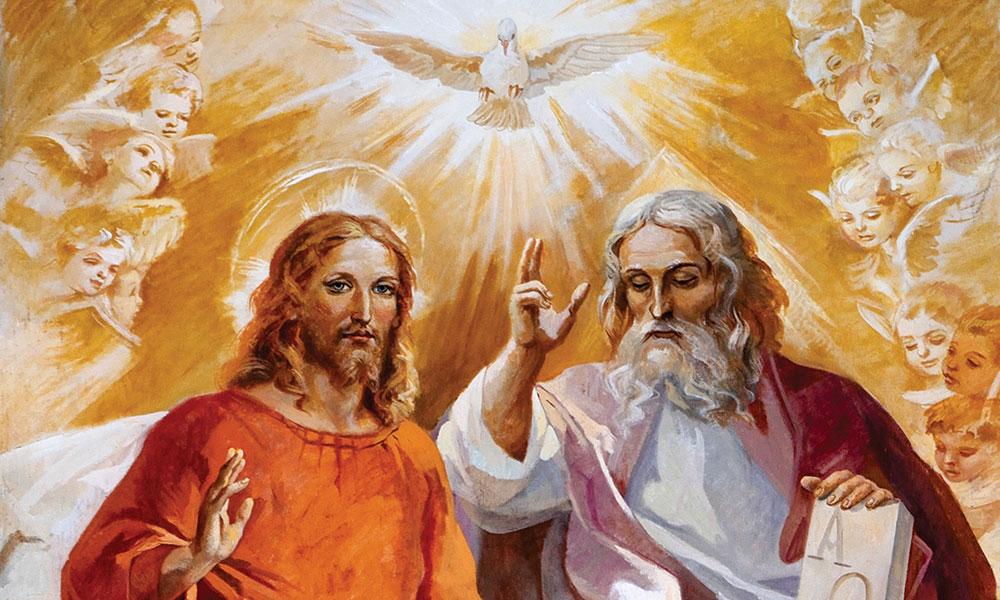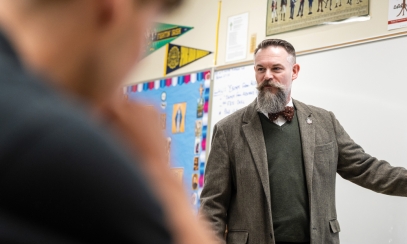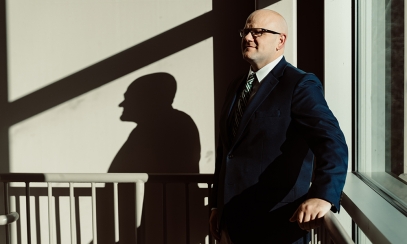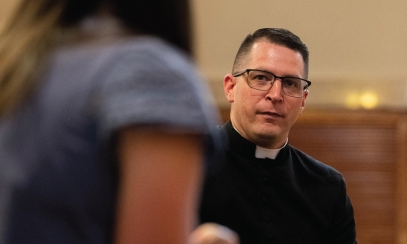
The Sacramental Life
What are the seven sacraments?
What are the seven sacraments?
Love is the fundamental need for all human beings. We want to be understood and accepted, to have our lives mean something, to know that we are being held close in someone’s heart. The most perfect experience of that kind of love can only be found in one place, and we are born with a desire for that – with a longing for God.
While we can see God in his creation, and know through faith that he is with us, nothing compares with the reality of God’s presence in the sacraments. The sacraments are defined as “an outward sign instituted by Christ to give grace.” Early Christians used the Greek word mysterion – “that to which signs referred; a reality laced with the unseen presence of God.”
The sacraments act ex opere operato (literally, “by the very fact of the action being performed”), so they happen through the saving work of Christ, the power of God, and not through the righteousness of either the celebrant or the recipient. (CCC 1128)
During these last few months of pandemic, many of us have not been able to participate fully in the sacramental life of the Church, and that has been a source of grief. As we gradually reopen our church buildings, here is a reminder of how the sacraments are the cornerstone of our spiritual lives.
Baptism
Baptism incorporates us into Christ and forms us into God’s people. This first sacrament pardons all our sins, rescues us from the power of darkness and brings us to the dignity of adopted children – a new creation through water and the power of the Holy Spirit. Hence we are called, and indeed are, children of God. One of the two principal effects of baptism is the purification from sins: “By baptism all sins are forgiven, original sin and all personal sins, as well as all punishment for sin.” In baptism, the person truly is reborn with nothing remaining that could impede his or her entry into the kingdom of God.
The other principal effect of baptism is new birth in the Holy Spirit. The baptized person becomes “a new creature, an adopted [child] of God, who has become a ‘partaker of the divine nature,’ member of Christ and co-heir with him, and a temple of the Holy Spirit.” (CCC 1263,1265)
“For the first time in your life, it is actually a fresh start. You’re completely purified of your sins.
We’re not Christians because of what we get out of it. We’re Christians because we love God. That should be our motivating principle. In this short year that I’ve been pursuing Catholicism, I’ve been more at peace than I ever have in my life.” – Morgan Morrison
Confirmation
The sacrament of confirmation is “necessary for the completion of baptismal grace.” In confirmation, the baptized is anointed with oil (a sign of abundance, joy, cleansing, healing and strength) and is thereby consecrated, or imprinted, with the seal of the Holy Spirit. As Christ was marked with his Father’s seal, Christians are marked with the seal of the Holy Spirit, indicating “our total belonging to Christ, our enrollment in his service forever, as well as the promise of divine protection in the great eschatological [end times] trial.”
The primary effect of the sacrament is the “full outpouring of the Holy Spirit as once granted to the apostles on the day of Pentecost.” (CCC 1285, 1296, 1302)
“The Holy Spirit put this huge call on my heart to go to confession. I did, with some fear and trembling. I walked out of the confessional 20 pounds lighter and a different person. I understood I had to do things different. This is probably when I opened myself to receive the grace I was given in confirmation years earlier.” – Paul Fahey
Eucharist
The Eucharist is the source and summit of the Christian life. Christ told us, “I am the bread of life; whoever comes to me will never hunger, and whoever believes in me will never thirst … whoever eats this bread will live forever.” (Jn: 35, 51) In this sacrament, bread and wine are transformed into the body and blood of Christ himself. The Eucharist is the food and drink that alone satisfies – it is a profoundly intimate moment when we receive Christ’s body and blood in holy Communion.
“One day my son, Joaquin, came home from second grade at St. Mary School [Charlotte] so excited to make his First Holy Communion and reconciliation. The books and stories he shared … I don’t know how to describe it. They just lit something inside me, something that helped me remember the joy I felt as a young boy in love with Jesus.
Attending classes and learning more about my faith, I realized I had been seeing in gray. Through RCIA, I gained clarity and could see things in color again. It felt really emotional, having the spirit of Christ with me along this path. When Joaquin made his first Communion and I was confirmed at Easter Vigil, it was one of the best things in my life.” – Gregorio Escutia
“During Thanksgiving week in my junior year of school, I encountered God through the sacrament of the Eucharist. This was the first time that I truly understood what I was consuming when I put the small, circular piece of bread into my mouth. I was in second grade when I received my first Communion, and it was not until I was in 11th grade that I realized that Jesus died for me and entered my body when I received the Eucharist.” – Abigail Kazmierski
Marriage
Marriage is more than just a natural institution – God is its author and it has been elevated by Christ to the level of sacrament. Marriage is a gift we receive rather than something we construct or change to fit our purposes.
The profound way the sacrament of marriage allows us to share in God’s own life is vividly illustrated in the Book of Genesis. We are taught that at each phase of creation God issues a command to “Let there be …” and it comes to pass. Something new comes into being that did not exist a moment before. This command is, in a sense, the verbal manifestation of God’s free consent to create.
The spouses participate in this same act of creation during the marriage ceremony where the two are required to consent before the community to the creation of the union. The catechism (1626-27) teaches that “the exchange of consent between the spouses,” their mutual “Let there be …”, is the “indispensable element that ‘makes the marriage’” and brings the marriage into being as a new creation.
“Without God and the grace of the sacrament, struggles can seem insurmountable. But with God at the center, marriage is wonderful and joyful, even in the struggles.” – Aaron Decker
Holy Orders
Holy orders, or the sacrament of apostolic ministry, is the sacramental act that incorporates a man into one of three recognized “orders”: bishop (ordo episcoporum), presbyter or priest (ordo presbyterorum) or deacon (ordo diaconorum). It is through this sacrament that the mission entrusted by Christ to his apostles continues to be exercised in the Church.
Like baptism and confirmation, ordination imprints an “indelible sacramental character” upon the ordained that cannot be repeated or conferred temporarily. Through his ordination, the recipient is configured to Christ so that he may serve as Christ’s instrument for his Church.
“The day after my ordination, when I read the Gospel at Mass as a deacon for the first time, I nearly wept. In some ways, that has been a paradigm of my diaconal ministry – not the weeping part, of course, but the awareness of such a great gift received, which gave rise to those tears of gratitude. I hope God will make me a priest who is always grateful.”
– Father Brian Lenz
Reconciliation
Sin is never simply personal in its impact. It always has a social consequence as well. It breaks our personal communion with God and, at the same time, it damages our communion with the Church, thereby having an impact on the body’s relationship with its head, Jesus Christ. Consequently, the healing of this rupture requires reconciliation with both God and Christ’s body, the Church.
The sacrament of reconciliation (or penance) liturgically expresses and accomplishes just this. The whole purpose and effect of this sacrament consists in “restoring us to God’s grace and joining us with him in an intimate friendship.” It brings about the “restoration of the dignity and blessings of the life of the children of God.” (CCC 1468) It is a great gift since the sacrament repairs that communion for which we are destined.
“My teacher told me that there was a wall between Jesus and me. Every time you sin, rocks get added and the wall gets bigger. Then when you do reconciliation, the wall comes down and you can be with Jesus.” – Joaquin Escutia
Anointing of the sick
Recognizing the challenge of illness and the seriousness of the choice we face in responding to illness, the Church points to the sacrament called the anointing of the sick. The Church believes Christ instituted this sacrament especially to strengthen us when we are being tried by illness.
Christ is the great physician whose compassion toward the sick is well documented in the Gospels. He even goes so far as to identify himself with the infirm in the Gospel of Matthew (25:36): “I was sick and you visited me.” He asks the sick to believe, he lays his hands upon them and allows them to touch him.
When we receive the sacrament, we are given the grace “of strengthening, peace and courage to overcome the difficulties that go with the condition of serious illness or the frailty of old age.” (CCC 1520)
“Anointing of the sick is for all Catholics. The complete ritual includes prayer, anointing with oil, confession, if the patient is able, the apostolic pardon and viaticum – Communion, literally food for the journey. If the patient is not able to eat, I offer the Eucharist to their family. It takes about 30 or 40 minutes to go through the complete ceremony. Usually while I give this sacrament, I watch the patient’s vital signs on the monitor. It’s amazing how often I see their breathing slow down and heart rate smooth out. You can actually watch the calm and peace come over them.”
– Father Lew Eberhart



